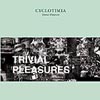 Within 25 minutes of pressing play everything in this space will bebleached, cleansed, and returned to its proper place. There is nothingout of place, no surface smudged, and no voices speaking aboveeachother; everything is closely, carefully, and painfully monitored.Cyclotimia's cold, cold presentation makes the setting of Orwell's 1984seem like a happy place filled with the vibrant activity of free andstrong people. The mechanical and soulless presentation makes sense,though: Trivial Pleasures comes with a booklet that outlinesNasdaq's personal mission statement and provides information on"Miniaturized, Implantable Identification Technology;" the implicationis clearly that of a Big Brother atmosphere. In addition, this albumwas apparently inspired by Wim Merten's For Amusement Only, acomposition written for pinball machines. The inspiration shows: manyof the sounds are repeated loops of chimey and high pitched ringsmodulating through various tones. The effect is dizzying and somewhatfrightening. The sounds of knives scratching together crash into achaos of tin and other metals crushing together while synthesizers moandeep beneath the surface of some icey landscape - this is not intendedfor pleasant afternoon listening. For all of its alien facts, Trivial Pleasuresis surprisingly fun to listen to. There's an element of cynicism thathas to be appreciated in songs like "Market Experts." Horrible machinesused to grind human bones to pulp churn underneath a repeated vocalloop... "analyzed by experts, analyzed by experts, analyzed byexperts." Everything is perfectly safe, trust me! All that happens hereis in the best interest of the people! Nothing here could be possiblybe of any harm, right? And with a laugh Cyclotimia grin and continue togrind out the choking sound of capitalist industry. Though this kind ofjumbled noise would normally turn me off, Trivial Pleasures manages to keep my interest. Granted, it's a short album, but that only works to its advantage.
Within 25 minutes of pressing play everything in this space will bebleached, cleansed, and returned to its proper place. There is nothingout of place, no surface smudged, and no voices speaking aboveeachother; everything is closely, carefully, and painfully monitored.Cyclotimia's cold, cold presentation makes the setting of Orwell's 1984seem like a happy place filled with the vibrant activity of free andstrong people. The mechanical and soulless presentation makes sense,though: Trivial Pleasures comes with a booklet that outlinesNasdaq's personal mission statement and provides information on"Miniaturized, Implantable Identification Technology;" the implicationis clearly that of a Big Brother atmosphere. In addition, this albumwas apparently inspired by Wim Merten's For Amusement Only, acomposition written for pinball machines. The inspiration shows: manyof the sounds are repeated loops of chimey and high pitched ringsmodulating through various tones. The effect is dizzying and somewhatfrightening. The sounds of knives scratching together crash into achaos of tin and other metals crushing together while synthesizers moandeep beneath the surface of some icey landscape - this is not intendedfor pleasant afternoon listening. For all of its alien facts, Trivial Pleasuresis surprisingly fun to listen to. There's an element of cynicism thathas to be appreciated in songs like "Market Experts." Horrible machinesused to grind human bones to pulp churn underneath a repeated vocalloop... "analyzed by experts, analyzed by experts, analyzed byexperts." Everything is perfectly safe, trust me! All that happens hereis in the best interest of the people! Nothing here could be possiblybe of any harm, right? And with a laugh Cyclotimia grin and continue togrind out the choking sound of capitalist industry. Though this kind ofjumbled noise would normally turn me off, Trivial Pleasures manages to keep my interest. Granted, it's a short album, but that only works to its advantage.
Two new shows just for you. We have squeezed out two extended release episodes for this weekend to get you through this week. They contain mostly new songs but there's also new issues from the vaults. The first show features music from Rider/Horse, Mint Field, Robert Aiki Aubrey Lowe, Anastasia Coope, ISAN, Stone Music, La Securite, Bark Psychosis, Jon Rose, Master Wilburn Burchette, Umberto, Wand, Tim Koh, Sun An, and Memory Drawings. The second episode has music by Laibach, Melt-Banana, Chuck Johnson, X, K. Yoshimatsu, Dorothy Carter, Pavel Milyakov, Violence Gratuite, Mark Templeton, Dummy, Endon, body / negative, Midwife, Alberto Boccardi, Divine. Cow in Maui from Veronika in Vienna. Get involved: subscribe, review, rate, share with your friends, send images! |



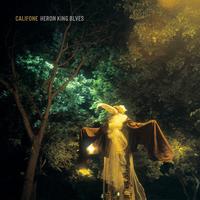 The opening notes of "Wingbone," sharp and clear as a bell are asdirect as Califone wishes to get on their new record. The trackpossesses a tightness and clarity of meaning that will slip away acrossthe rest of the record, though not in a bad way. Every strum and pluckrings out beautifully, vividly presenting itself before slowly fadingback into the darkness. Of all the tracks on Heron King Blues,this one is the most organic and most immediately satisfying, anintroduction to the extended dream about to be let loose and spill outits unconscious thoughts without elaboration. The music was crafted ina manner similar to the bands previous Declaration releases,either wholly improvised or devised in the studio. After the rawmaterials are put to tape, they are put through the process, cut,dubbed, and patched into an electro-acoustic meld. This approachdeepens to drifting, dreamlike sprawl that pervades the record. "Apple"is dominantly percussive, bubbling with a collage of sounds ofindeterminate origin, some pastiche of real drums and mechanicalapproximations that along with Tim Rutili's hushed, choppy vocalsgivethe track a compellingly breathless tempo. "2 Sisters Drunk on EachOther" is far removed from the pastoral feel of the rest of the disc,with chiming guitars and a flanged and funky bass line. Overdubbedhorns criss-cross over one another, squealing out nonsense melodies.This track seems as if it would be right at home mixed into a dance setlist. Though it does stick out on the disc, it is distinctly Califone,pitting sound against sound ever so subtly to develop tension andenergy in a subdued way. The title track, spanning almost fifteenminutes, is an elongated jam session that puts the strengths of theband's improvisation skills and the attentiveness of the listener tothe test. While there are intriguing moments in the midst, it can besomewhat taxing. By its end, Heron King Blues has escaped formand function and spun off into a nebulous place, the band finding theirvoice in that mist as strong (if not as clear) as it is on solidground.
The opening notes of "Wingbone," sharp and clear as a bell are asdirect as Califone wishes to get on their new record. The trackpossesses a tightness and clarity of meaning that will slip away acrossthe rest of the record, though not in a bad way. Every strum and pluckrings out beautifully, vividly presenting itself before slowly fadingback into the darkness. Of all the tracks on Heron King Blues,this one is the most organic and most immediately satisfying, anintroduction to the extended dream about to be let loose and spill outits unconscious thoughts without elaboration. The music was crafted ina manner similar to the bands previous Declaration releases,either wholly improvised or devised in the studio. After the rawmaterials are put to tape, they are put through the process, cut,dubbed, and patched into an electro-acoustic meld. This approachdeepens to drifting, dreamlike sprawl that pervades the record. "Apple"is dominantly percussive, bubbling with a collage of sounds ofindeterminate origin, some pastiche of real drums and mechanicalapproximations that along with Tim Rutili's hushed, choppy vocalsgivethe track a compellingly breathless tempo. "2 Sisters Drunk on EachOther" is far removed from the pastoral feel of the rest of the disc,with chiming guitars and a flanged and funky bass line. Overdubbedhorns criss-cross over one another, squealing out nonsense melodies.This track seems as if it would be right at home mixed into a dance setlist. Though it does stick out on the disc, it is distinctly Califone,pitting sound against sound ever so subtly to develop tension andenergy in a subdued way. The title track, spanning almost fifteenminutes, is an elongated jam session that puts the strengths of theband's improvisation skills and the attentiveness of the listener tothe test. While there are intriguing moments in the midst, it can besomewhat taxing. By its end, Heron King Blues has escaped formand function and spun off into a nebulous place, the band finding theirvoice in that mist as strong (if not as clear) as it is on solidground.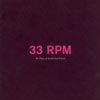 Joining Ju-Jikan: Ten Hours Of Sound From Japan and Variable Resistance: Ten Hours of Sound From Australia, 33 RPM is the companion disc to the newest installment in an ongoing sound art exhibition series at SFMOMA. "Ten Hours" is part of the exhibition title and does not refer to the amount of music on this disc, which is a full length, non-mp3 sampler of different artists from the show. Like its predecessors, 33 RPM (thankfully) does not attempt a survey of its particular country's experimental music history, instead focusing largely on newer artists with a few older luminaries included for comparison and continuity.
Joining Ju-Jikan: Ten Hours Of Sound From Japan and Variable Resistance: Ten Hours of Sound From Australia, 33 RPM is the companion disc to the newest installment in an ongoing sound art exhibition series at SFMOMA. "Ten Hours" is part of the exhibition title and does not refer to the amount of music on this disc, which is a full length, non-mp3 sampler of different artists from the show. Like its predecessors, 33 RPM (thankfully) does not attempt a survey of its particular country's experimental music history, instead focusing largely on newer artists with a few older luminaries included for comparison and continuity.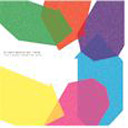 Un Caddie's last 3" CD release quickly became my favorite amongDekorder's promising early flourish of activity. The Barcelona-basedartist must be pleased with the young label (started by former DiscoBruit personnel) as Like a packed cupboardis the first full-length from outside his own Ooze.Bap imprint. Therecord is a perfect continuation of the previous Dekorder disc, abeautiful, unassuming blanket of multiethnic instrumentation arrangedvia the artist's laptop, which acts merely as a locus for connectingthe various parts of this one-man, transcontinental ensemble. Un Caddiekeeps a dreamy, spacious mood throughout, never allowing hisadventurous sound palette to the get the better of him, or driftinginto technical excess. The digital looping and splicing is just enoughto shift the focus away from the unique assimilation of mbira, kalimba,double bass, guitar, even berimbau, serving only to accentuate thestreamlined precision at the core of Cupboard's mesmerizing,coastal ambience. The meandering pace of each track nicely suits theround organics of the instruments, minimally altered and blended with adegree of restraint that allows for the special qualities of each toshine through. Un Caddie escapes easy estimations, harping on hisexploratory sound-grabbing or fusionist approach, by creating songsthat arrive with a haphazard slowness, quietly building around simple,effective figures. The comparisons to Sack & Blumm elicited by theartist's previous disc are equally apt here; he creates music with asimilarly bizarre sense of naïveté, as if performed by a child who'dgrown up in a room where of Sub-Saharan "toys" joined the Fischer-Pricepiano. The artist takes up a related agenda with Cupboard'sliner notes which include quotations from theorist John Hutnyk's"Critique of Exotica" and from Un Caddie himself, condemning thecapitalist labeling involved in any process of cultural hybridism.Going further, he has named the tracks with URLs for web resources inethnomusicology, cultural theory, and other awareness groups, makinghis interests impossible to ignore, and it's not hard to sympathizeafter time spent drifting along with this beautiful, label-less music.
Un Caddie's last 3" CD release quickly became my favorite amongDekorder's promising early flourish of activity. The Barcelona-basedartist must be pleased with the young label (started by former DiscoBruit personnel) as Like a packed cupboardis the first full-length from outside his own Ooze.Bap imprint. Therecord is a perfect continuation of the previous Dekorder disc, abeautiful, unassuming blanket of multiethnic instrumentation arrangedvia the artist's laptop, which acts merely as a locus for connectingthe various parts of this one-man, transcontinental ensemble. Un Caddiekeeps a dreamy, spacious mood throughout, never allowing hisadventurous sound palette to the get the better of him, or driftinginto technical excess. The digital looping and splicing is just enoughto shift the focus away from the unique assimilation of mbira, kalimba,double bass, guitar, even berimbau, serving only to accentuate thestreamlined precision at the core of Cupboard's mesmerizing,coastal ambience. The meandering pace of each track nicely suits theround organics of the instruments, minimally altered and blended with adegree of restraint that allows for the special qualities of each toshine through. Un Caddie escapes easy estimations, harping on hisexploratory sound-grabbing or fusionist approach, by creating songsthat arrive with a haphazard slowness, quietly building around simple,effective figures. The comparisons to Sack & Blumm elicited by theartist's previous disc are equally apt here; he creates music with asimilarly bizarre sense of naïveté, as if performed by a child who'dgrown up in a room where of Sub-Saharan "toys" joined the Fischer-Pricepiano. The artist takes up a related agenda with Cupboard'sliner notes which include quotations from theorist John Hutnyk's"Critique of Exotica" and from Un Caddie himself, condemning thecapitalist labeling involved in any process of cultural hybridism.Going further, he has named the tracks with URLs for web resources inethnomusicology, cultural theory, and other awareness groups, makinghis interests impossible to ignore, and it's not hard to sympathizeafter time spent drifting along with this beautiful, label-less music.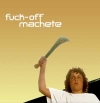 If Fuck-off Machete succeeds in nothing else, the band will at leasthave three things going for them: one of the best names for a rock bandever; one of the funniest album art concepts in recent memory; and morepress earned for the horribly underrated Ganger, whose bassist NatashaNoramly is one of the Machete's key members. It would go like this inthe record shops — Dude 1: "Who's 'Fuck-off Machete?'" Dude 2: "Thechick from Ganger's new band." D1: "Who's Ganger?" D2: "Dude, come overhere. You're not looking anymore, 'cause I know what you're getting."Now, for those who have already heard Ganger, this first step isunnecessary, and it's time to move right on to the Machete's soliddebut. This is a stronger, angrier, and dirtier band with vocals and alot more moxy. The same undertow of bass exists, and the same darkmelodies and playful attitude, but with Noramly as the ringmaster, thiscircus gets wild real quick. They have a feral quality, but there'salways a feeling like the bark is worse than the bite. That, or it'sbeing carefully held in to be unleashed with a swing that cuts off thelimbs and leaves bloody stumps. "Minority Gang" features her treatedrasp borrowing "Would I Lie to You" by the Eurythymics, but with anironic twist. She would, and she makes it plain. Most tracks start offwith an empassioned but subdued delivery, but then the aforementionedbludgeoning arrives. It never gets too bloody, though, andoccasionally, like on "Watch Them Crash," things start slow and staythere, though the Machete still gets quite a bit louder in places.Ultimately the name of the game on their debut seems to be that nakedemotion gets you everywhere. Noramly even splits vocal duties here andthere, all in the name of using the best voice for the task. Differentsongs, after all, have a different feel, and the distorted sex of hervoice may not necessarily do. By the record's end, the band lets it allout on "My Machines" and then tries out a little synth and strangenesson "Panda." It's a nice touch, showing off a little of where else theycan go. Next time, maybe. For now, it's a strong debut and it's nice tohear that Aereogramme isn't the only post-Ganger band with some chops.
If Fuck-off Machete succeeds in nothing else, the band will at leasthave three things going for them: one of the best names for a rock bandever; one of the funniest album art concepts in recent memory; and morepress earned for the horribly underrated Ganger, whose bassist NatashaNoramly is one of the Machete's key members. It would go like this inthe record shops — Dude 1: "Who's 'Fuck-off Machete?'" Dude 2: "Thechick from Ganger's new band." D1: "Who's Ganger?" D2: "Dude, come overhere. You're not looking anymore, 'cause I know what you're getting."Now, for those who have already heard Ganger, this first step isunnecessary, and it's time to move right on to the Machete's soliddebut. This is a stronger, angrier, and dirtier band with vocals and alot more moxy. The same undertow of bass exists, and the same darkmelodies and playful attitude, but with Noramly as the ringmaster, thiscircus gets wild real quick. They have a feral quality, but there'salways a feeling like the bark is worse than the bite. That, or it'sbeing carefully held in to be unleashed with a swing that cuts off thelimbs and leaves bloody stumps. "Minority Gang" features her treatedrasp borrowing "Would I Lie to You" by the Eurythymics, but with anironic twist. She would, and she makes it plain. Most tracks start offwith an empassioned but subdued delivery, but then the aforementionedbludgeoning arrives. It never gets too bloody, though, andoccasionally, like on "Watch Them Crash," things start slow and staythere, though the Machete still gets quite a bit louder in places.Ultimately the name of the game on their debut seems to be that nakedemotion gets you everywhere. Noramly even splits vocal duties here andthere, all in the name of using the best voice for the task. Differentsongs, after all, have a different feel, and the distorted sex of hervoice may not necessarily do. By the record's end, the band lets it allout on "My Machines" and then tries out a little synth and strangenesson "Panda." It's a nice touch, showing off a little of where else theycan go. Next time, maybe. For now, it's a strong debut and it's nice tohear that Aereogramme isn't the only post-Ganger band with some chops.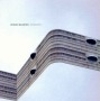 This debut from Donato Wharton is the lost soundtrack to the works ofAsimov, where each track tells of a different character in a newsituation, like the various stages and chapters of "I, Robot." Storieslike these must be trapped in Wharton's head, but my imagination ranwild to create chapters of my own. I found the record to be more of alove tale, where computers and devices feel, for the first time, realemotions, and try to move through life with this new knowledge, only tofind how crippling these newfound and deeply wondered about feelingsare. The facts — that Wharton comes from Cardiff through Stuttgart andspends his time composing music for theater works — all have voices inhis brand of electronic music. All these experiences are present andaccounted for when the sounds plays through the speakers. It's theemotions and feelings that are created that make this truly unique, andon TrabantenWharton uses classic sounds to compose songs that raise genuine imagesand memories. "Built to Fail" starts this vision off right: the trackis all awkward rhythms formed by the splicing of tracks to create astumbling effect. There's hope, like the whole thing will get on itsfeet and walk like it manages to at the end, but ultimately it willfall apart again. It has to, because any effort of this kind willultimately due to the weight and pressure of it all. "Silvester" beepsand clicks like a pining love, like a machine falls in love with thevoice that travels on its wires. "Is That While Yr Still on Earth" iseavesdropping on multiple lines: the first hint that these dreams canturn dark, destroying what creates or feels them equally. And so thestory progresses, track after track, as the wires try to own andpossess more that they can call their own, only to find out in the endthat they can't really own anything. Depressing, sure, but it's still amarvel. Just when I think this whole digital revolution is a crock andthat the whole thing should just implode upon itself, I hear a CD likethis one. The real crock is this: the promise of technology producingall these frank and amazing artists purely by the mass availability ofsampling and recording technologies for anyone to use on their Mac orPC. There still must be artistry of some sort, some originality orunique voice that demands this technology to truly be heard, andWharton definitely has that in spades.
This debut from Donato Wharton is the lost soundtrack to the works ofAsimov, where each track tells of a different character in a newsituation, like the various stages and chapters of "I, Robot." Storieslike these must be trapped in Wharton's head, but my imagination ranwild to create chapters of my own. I found the record to be more of alove tale, where computers and devices feel, for the first time, realemotions, and try to move through life with this new knowledge, only tofind how crippling these newfound and deeply wondered about feelingsare. The facts — that Wharton comes from Cardiff through Stuttgart andspends his time composing music for theater works — all have voices inhis brand of electronic music. All these experiences are present andaccounted for when the sounds plays through the speakers. It's theemotions and feelings that are created that make this truly unique, andon TrabantenWharton uses classic sounds to compose songs that raise genuine imagesand memories. "Built to Fail" starts this vision off right: the trackis all awkward rhythms formed by the splicing of tracks to create astumbling effect. There's hope, like the whole thing will get on itsfeet and walk like it manages to at the end, but ultimately it willfall apart again. It has to, because any effort of this kind willultimately due to the weight and pressure of it all. "Silvester" beepsand clicks like a pining love, like a machine falls in love with thevoice that travels on its wires. "Is That While Yr Still on Earth" iseavesdropping on multiple lines: the first hint that these dreams canturn dark, destroying what creates or feels them equally. And so thestory progresses, track after track, as the wires try to own andpossess more that they can call their own, only to find out in the endthat they can't really own anything. Depressing, sure, but it's still amarvel. Just when I think this whole digital revolution is a crock andthat the whole thing should just implode upon itself, I hear a CD likethis one. The real crock is this: the promise of technology producingall these frank and amazing artists purely by the mass availability ofsampling and recording technologies for anyone to use on their Mac orPC. There still must be artistry of some sort, some originality orunique voice that demands this technology to truly be heard, andWharton definitely has that in spades.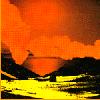 After unveiling their unique brand of instrumental heaviness on lastyear's untitled EP, Pelican nudge things one step further with this,their first full-length release. Australasia is that fictional landmass which, along with the Americas and Great Britain, comprises theempire of Oceania in George Orwell's 1984. Pelican create a similar topography of impending dystopia with the dark, crushing riffs of their Australasia. Pelican unashamedly summon the spirits of Black Sabbath, Master of Puppets-eraMetallica and The Melvins, creating a six track album of surprisingdynamism and complexity. Every track uses the same simple sonicpalette: heroic minor-key riffing interwoven with layers of crunchy,expansive rhythm guitar. Their long-form compositions take each themethrough several dramatic tempo changes, allowing them the chance torevisit certain key themes and gain momentum with each repetition.Pelican are instrumentalists of the highest order; their guitarsymphonies are so incredibly lyrical that vocals would be animposition. Comparisons to post-rockers Explosions in the Sky might beappropriate, but Pelican aren't interested in delayed gratification.They cut out all of the chamber-ensemble warm-up and dive in headfirst,barreling forward on their own intense propulsion. "Nightendday"imagines a sky filled with smokestacks and searchlights, a brutaldictatorial regime where the only escape is to rock as fully and ashard as possible, breaking through the barbed-wired borders of tyranny."Angel Tears" is absolutely stunning, a sweeping, cinematic dirgeimbued with a driving rhythm section that keeps threatening to upenditself, but miraculously manages to stay on track. Track five, which ispurposely left untitled, is the album's sole respite: an hauntinglybeautiful symphony of interlacing acoustic guitars with subtlesynthesizer flourishes. It's Pelican's answer to the heavy metal powerballad. The album ends on a high note, with the monolithic 11-minutetitle track, full of fuzzy, cyclical riffage so massive, at highvolumes on headphones it threatens to deepen the fissure of my brain.Calling this "stoner metal" would be a disservice to the precision andaccuracy with which the foursome deploy their arsenal. Australasia is a substantial album, but it nonetheless leaves me with a desire to hear more.
After unveiling their unique brand of instrumental heaviness on lastyear's untitled EP, Pelican nudge things one step further with this,their first full-length release. Australasia is that fictional landmass which, along with the Americas and Great Britain, comprises theempire of Oceania in George Orwell's 1984. Pelican create a similar topography of impending dystopia with the dark, crushing riffs of their Australasia. Pelican unashamedly summon the spirits of Black Sabbath, Master of Puppets-eraMetallica and The Melvins, creating a six track album of surprisingdynamism and complexity. Every track uses the same simple sonicpalette: heroic minor-key riffing interwoven with layers of crunchy,expansive rhythm guitar. Their long-form compositions take each themethrough several dramatic tempo changes, allowing them the chance torevisit certain key themes and gain momentum with each repetition.Pelican are instrumentalists of the highest order; their guitarsymphonies are so incredibly lyrical that vocals would be animposition. Comparisons to post-rockers Explosions in the Sky might beappropriate, but Pelican aren't interested in delayed gratification.They cut out all of the chamber-ensemble warm-up and dive in headfirst,barreling forward on their own intense propulsion. "Nightendday"imagines a sky filled with smokestacks and searchlights, a brutaldictatorial regime where the only escape is to rock as fully and ashard as possible, breaking through the barbed-wired borders of tyranny."Angel Tears" is absolutely stunning, a sweeping, cinematic dirgeimbued with a driving rhythm section that keeps threatening to upenditself, but miraculously manages to stay on track. Track five, which ispurposely left untitled, is the album's sole respite: an hauntinglybeautiful symphony of interlacing acoustic guitars with subtlesynthesizer flourishes. It's Pelican's answer to the heavy metal powerballad. The album ends on a high note, with the monolithic 11-minutetitle track, full of fuzzy, cyclical riffage so massive, at highvolumes on headphones it threatens to deepen the fissure of my brain.Calling this "stoner metal" would be a disservice to the precision andaccuracy with which the foursome deploy their arsenal. Australasia is a substantial album, but it nonetheless leaves me with a desire to hear more.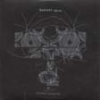 The electronic and live instrumentation mixing duo of Adrian Corker andPaul Conboy have recently been writing the next Bomb the Bass albumwith Tim Simenon. Ahead of that, Corker/Conboy's Radiant Idiotis a dark obsession with minor chords that transforms their music intoa beautiful new creature with a life all its own. Their sophomore setis a true renovation of their formerly derivative sound with intriguingadditions and finer melodies. The electronics are more an atmospherictouch than an active participant, and with new instruments joining thegroup's repertoire, the possibilities are endless. Shutters anddelicate guitar open the record, and soon hefty live drums and a lowmuddy bass join in, and the guitar and the song go all filthy energy. Afull-on freak-out ensues, reminding me vaguely of the new direction ofPele, and suddenly I'm eager for more. There's a drive, an urgencypresent, on these songs that may have been there before, but never thisovert, and it's a breath of fresh air. The music is still so structuredand controlled in its fluidity, like every move is planned, but I coulddefinitely tell that these two were taking chances this time around.The slow groove of "Portland Grove Am" is simply lovely and comforting,with a simple repeated melody and layered stringed instruments overtop.Interesting guest contributions rear their heads here and there, likeIan Dixon's pulse-quickening trumpet work on "Get 1 Over." Changingrhythms also bring a freshness: a shuffle here and a dirge there with alittle bit of a groove in between creates a great make-out record, withshifts in tempo bringing peaks and valleys in the action. Strangely,the only track that didn't do anything for me is the title track, alsothe longest at just over eight minutes. It moves like a symphony,gracefully sliding in and out of different phases, but it reallydoesn't get where it feels like it's going. Still, the generalexperience of the album is a pleasing one, and a real evolution fromtheir previous efforts.
The electronic and live instrumentation mixing duo of Adrian Corker andPaul Conboy have recently been writing the next Bomb the Bass albumwith Tim Simenon. Ahead of that, Corker/Conboy's Radiant Idiotis a dark obsession with minor chords that transforms their music intoa beautiful new creature with a life all its own. Their sophomore setis a true renovation of their formerly derivative sound with intriguingadditions and finer melodies. The electronics are more an atmospherictouch than an active participant, and with new instruments joining thegroup's repertoire, the possibilities are endless. Shutters anddelicate guitar open the record, and soon hefty live drums and a lowmuddy bass join in, and the guitar and the song go all filthy energy. Afull-on freak-out ensues, reminding me vaguely of the new direction ofPele, and suddenly I'm eager for more. There's a drive, an urgencypresent, on these songs that may have been there before, but never thisovert, and it's a breath of fresh air. The music is still so structuredand controlled in its fluidity, like every move is planned, but I coulddefinitely tell that these two were taking chances this time around.The slow groove of "Portland Grove Am" is simply lovely and comforting,with a simple repeated melody and layered stringed instruments overtop.Interesting guest contributions rear their heads here and there, likeIan Dixon's pulse-quickening trumpet work on "Get 1 Over." Changingrhythms also bring a freshness: a shuffle here and a dirge there with alittle bit of a groove in between creates a great make-out record, withshifts in tempo bringing peaks and valleys in the action. Strangely,the only track that didn't do anything for me is the title track, alsothe longest at just over eight minutes. It moves like a symphony,gracefully sliding in and out of different phases, but it reallydoesn't get where it feels like it's going. Still, the generalexperience of the album is a pleasing one, and a real evolution fromtheir previous efforts. The most recent in an avalanche of new music taking a crack at resurrecting the dreamy, shoegazer pop of bands like My Bloody Valentine, Slowdive and Ride, Pluramon's Dreams Top Rock only distinguishes itself from the rest of the pack by not being quite as predictable. It helps that Marcus Schmickler has recruited Julee Cruise—the serene, childlike chanteuse of so many David Lynch soundtracks—to contribute vocals to the album. Julee's last album, the dreadful The Art of Being a Girl, was such a wasted opportunity that it's a pleasure to hear her placed in the hands of a producer who can wield her peculiar vocal talents properly.
The most recent in an avalanche of new music taking a crack at resurrecting the dreamy, shoegazer pop of bands like My Bloody Valentine, Slowdive and Ride, Pluramon's Dreams Top Rock only distinguishes itself from the rest of the pack by not being quite as predictable. It helps that Marcus Schmickler has recruited Julee Cruise—the serene, childlike chanteuse of so many David Lynch soundtracks—to contribute vocals to the album. Julee's last album, the dreadful The Art of Being a Girl, was such a wasted opportunity that it's a pleasure to hear her placed in the hands of a producer who can wield her peculiar vocal talents properly.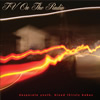 Young Liars, released this past summer, was an intoxicating shotof dark, precise sound; at once both deeply passionate and eerilychilly, the product of a gospel choral that had lost its way andpreferred to creep out unsuspecting subway riders rather than bask inany holy warmth. While that EP showcased a few densely packed tracks,their new LP finds that intensity strung across a larger canvas,changing the shape and color into something that asks for more patienceand observation. "The Wrong Way" is a charmer, thudding along withsoupy bass and percussion as baritone and alto saxophones bleat andsupport the vocal harmonies of the three members, which sound like asnapping ragtime chorus, full bodied and drawling. Though the musicalfoundation is simple and loopy, it serves as a perfect background forthe expressive vocals that rise and fall with bursts of energy, beggingfor the pews to raise their hands and chime in. "Ambulance" eschews anykind of pretense that Tunde Adebimpe's vocals are not the core of thisband's power, dropping the fuzzy noise collages for an acapellaexcursion. Adebimpe's breathy triplets on the song's chorus of "I /will be / your / ac / ci / dent / if you / will be / my am / bu /lance," caress every syllable, giving them each proper considerationbefore spilling them out in his smooth baritone. Unfortunately, theslower tracks, like "Don't Love You," lack the amorphous, ephemeralquality that made "Blind" from their past EP such a spooky, alluringlisten. Where before a lurch was arresting, visceral, here they areclumsy and cautious. "Poppy" suffers from a relatively banal guitarriff that comprises the bulk of the track. While this is hardly enoughto invalidate any interest in Desperate Youth, Bloodthirsty Babes,it is indicative that the group finds themselves searching for the nextstep, the next mode for their sound. "Bomb Yourself" finds thosebrilliant harmonies sprawling across a bass heavy, dub-inflected bed,capturing a deep groove. The raw quality of TV on the Radio's energy,and their recklessly experimental tendencies make listening to everynook and cranny of their tinkered sound interesting, and hints at evenmore dramatic pieces in the future.
Young Liars, released this past summer, was an intoxicating shotof dark, precise sound; at once both deeply passionate and eerilychilly, the product of a gospel choral that had lost its way andpreferred to creep out unsuspecting subway riders rather than bask inany holy warmth. While that EP showcased a few densely packed tracks,their new LP finds that intensity strung across a larger canvas,changing the shape and color into something that asks for more patienceand observation. "The Wrong Way" is a charmer, thudding along withsoupy bass and percussion as baritone and alto saxophones bleat andsupport the vocal harmonies of the three members, which sound like asnapping ragtime chorus, full bodied and drawling. Though the musicalfoundation is simple and loopy, it serves as a perfect background forthe expressive vocals that rise and fall with bursts of energy, beggingfor the pews to raise their hands and chime in. "Ambulance" eschews anykind of pretense that Tunde Adebimpe's vocals are not the core of thisband's power, dropping the fuzzy noise collages for an acapellaexcursion. Adebimpe's breathy triplets on the song's chorus of "I /will be / your / ac / ci / dent / if you / will be / my am / bu /lance," caress every syllable, giving them each proper considerationbefore spilling them out in his smooth baritone. Unfortunately, theslower tracks, like "Don't Love You," lack the amorphous, ephemeralquality that made "Blind" from their past EP such a spooky, alluringlisten. Where before a lurch was arresting, visceral, here they areclumsy and cautious. "Poppy" suffers from a relatively banal guitarriff that comprises the bulk of the track. While this is hardly enoughto invalidate any interest in Desperate Youth, Bloodthirsty Babes,it is indicative that the group finds themselves searching for the nextstep, the next mode for their sound. "Bomb Yourself" finds thosebrilliant harmonies sprawling across a bass heavy, dub-inflected bed,capturing a deep groove. The raw quality of TV on the Radio's energy,and their recklessly experimental tendencies make listening to everynook and cranny of their tinkered sound interesting, and hints at evenmore dramatic pieces in the future. 
